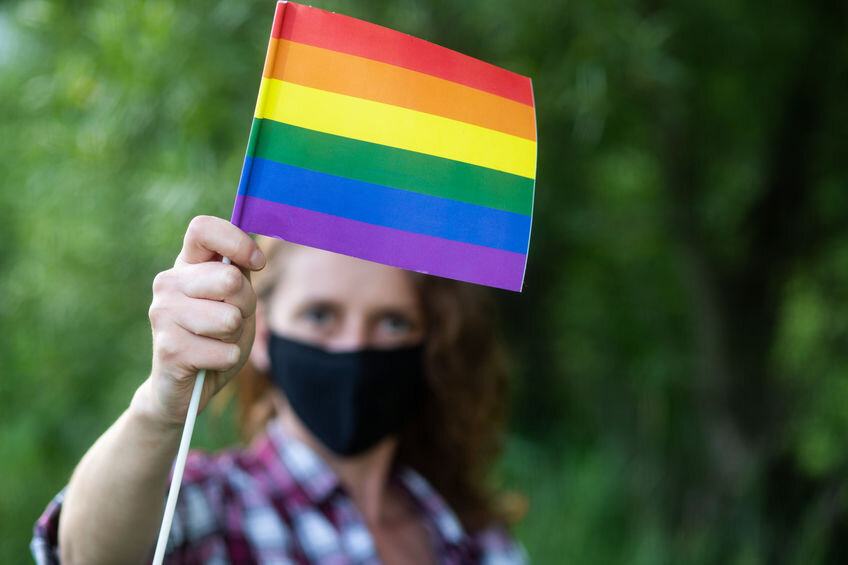The Impact of COVID-19 on the LGBTQ+ Community
November 2, 2020 by Justin Lehmiller
The COVID-19 pandemic has had a powerful impact on people’s sexual and romantic lives. At the Kinsey Institute, we conducted a study to explore how people’s intimate lives have fared during these challenging times, and we’ve found that rates of sexual activity are down on average and that many have reported deterioration in the quality of their relationships, although some have reported improvements.
But has the impact been the same on everyone? Specifically, are there differences in how things are going based on one’s sexual orientation? I dug into our data to find out.
I compared how those who identified as heterosexual were doing compared to those who identified as part of the LGBTQ+ community, and what I found is that sexual minorities appeared to be more stressed by the pandemic. They also reported elevated rates of engagement in solo sexual activities. Here is a brief summary of the findings:
- In general, those who identified as LGBTQ+ reported feeling more stressed and lonely, and they reported less life satisfaction compared to their heterosexual counterparts.
- LGBTQ+ participants reported more desire for masturbation and higher rates of self-stimulation during the pandemic than did heterosexuals.
- LGBTQ+ participants were more likely to report making new additions to their sex lives since the pandemic began. Specifically, they were more likely to report trying new solo or virtual activities for the first time, such as using sex toys or vibrators during masturbation, having cybersex, filming themselves masturbating, and visiting camming sites.
- LGBTQ+ participants reported feeling less satisfied with the amount of intimate touch they were receiving in their lives.
What accounts for these differences? There are several potential explanations:
- LGBTQ+ participants tended to be younger and they reported more concerns and worries about the financial impact that COVID-19 would have on them. This fits with other data finding that the financial effect of COVID-19 has been felt more by sexual minorities, in part, because they are more likely to work in industries that have been highly affected and they are less likely to have health insurance and access to healthcare. These factors could potentially contribute to the higher rates of stress and anxiety.
- LGBTQ+ participants were more likely to be living alone. This may contribute to feelings of loneliness, especially given the limitations on alternative opportunities for in-person socialization. Of course, it likely also plays a role in satisfaction with intimate touch because there are going to be fewer opportunities to physically connect with other persons.
- Prior to the pandemic, LGBTQ+ individuals were experiencing higher rates of mental health problems, including depression and anxiety, due to minority stress (i.e., frequent and stressful experiences with prejudice and discrimination) [1]. Thus, when a population that is already higher in stress encounters another potent stressor, this has the potential to exacerbate the impact of the new stressor.
- Higher rates of masturbation and trying new solo and virtual activities may reflect, in part, an adaptive coping strategy aimed at blunting the impact of stress and anxiety. Masturbation is an activity that many people use to relax and relieve stress, so it is possible that LGBTQ+ individuals may be masturbating more for this reason. However, as noted above, these individuals were also more likely to be living alone, so not having a live-in sexual partner could also be another reason for higher rates of masturbation.
It is important to note that our data are not representative of the overall population, so caution is warranted in drawing broad conclusions. However, they do line up with other reports suggesting that COVID-19 has put disproportionate strain on the LGBTQ+ community.
I should also note that these data were collected relatively early on in the pandemic, and it is possible that things have changed and that sexual minorities have found new and different ways to adapt to these challenges and cope with pandemic-related stress.
That said, these findings suggest that COVID-19 has had different impacts on different communities. As a result, it is important for policymakers to consider the unique challenges faced by diverse communities in developing plans to address this situation, as well as similar future situations that might arise.
Want to learn more about Sex and Psychology? Click here for previous articles or follow the blog on Facebook (facebook.com/psychologyofsex), Twitter (@JustinLehmiller), or Reddit (reddit.com/r/psychologyofsex) to receive updates. You can also follow Dr. Lehmiller on YouTube and Instagram.
[1] Kuyper, L., & Fokkema, T. (2011). Minority stress and mental health among Dutch LGBs: examination of differences between sex and sexual orientation. Journal of Counseling Psychology, 58(2), 222-233.
Image Source: 123RF/Melinda Nagy

Dr. Justin Lehmiller
Founder & Owner of Sex and PsychologyDr. Justin Lehmiller is a social psychologist and Research Fellow at The Kinsey Institute. He runs the Sex and Psychology blog and podcast and is author of the popular book Tell Me What You Want. Dr. Lehmiller is an award-winning educator, and a prolific researcher who has published more than 50 academic works.
Read full bio >


